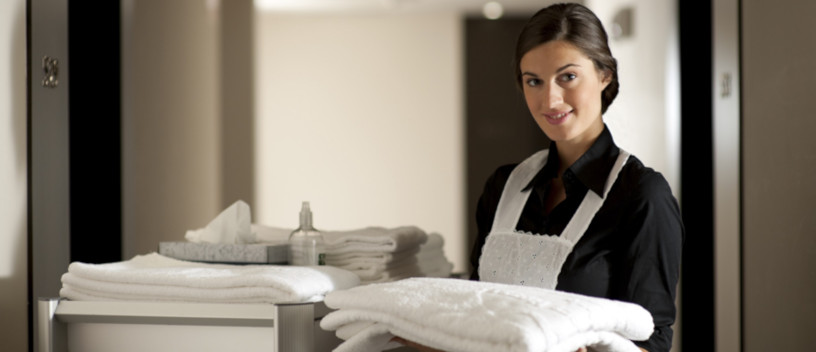In one of our latest publications on SOPs , we released our methodology to adapt operational standards to current trends. Today, we come back to tell you a little more about it, although this time we will focus on one of the departments that greatly influences customer satisfaction: the housekeeping department.
 The housekeeping department is one of the most valued departments by guests even though is the one that least personal interaction with the guests has, since one of its main functions is to take care of the cleanliness of the rooms and the hotel facilities without interrupting the rest and tranquility of the guests. However, while the housekeeping staff does not interact continuously with the guests, it is the department that has direct access to guests’ most intimate space, the room. Hence, hotel guests value cleanliness excellence while having their personal belongings treated with care and delicacy.
The housekeeping department is one of the most valued departments by guests even though is the one that least personal interaction with the guests has, since one of its main functions is to take care of the cleanliness of the rooms and the hotel facilities without interrupting the rest and tranquility of the guests. However, while the housekeeping staff does not interact continuously with the guests, it is the department that has direct access to guests’ most intimate space, the room. Hence, hotel guests value cleanliness excellence while having their personal belongings treated with care and delicacy.
Given the importance of the department’s impact on the final customer satisfaction, while developing SOP’s (Standard Operating Procedures) is crucial to reflect the company’s values and culture, as it can be an asset to the hotel’s online reputation. In order to accomplish this, the hotel factory collaborates in the design of the SOP’s, taking care of the smallest details:
-
The way employees must enter in the guest’s room depending on the situation.
-
The appropriate wording to use for each type of guest.
-
How to treat guests’ personal belongings.
-
The optimal cleaning method for each space.
-
The order of the steps to be followed while cleaning the room so that it is cleaned in the most efficient way and in the shortest time possible.
In addition, the hotel factory also advises on the most efficient working method for the housekeeping department: work in pairs vs work individually.
Work in pairs (an employee/junior with another senior) can offer a number of advantages, such as:
-
The reduction of physical exertion, especially at the time of making the bed, resulting in fewer resigns.
-
Continuous training of the maids thanks to the exchange of knowledge.
-
Increased motivation and improvement of the work environment among the staff because they are not alone during their shift.
-
It reduces the talk between employees in the hallway, so there is less noise that can annoy guests who are in the rooms
However, it also has some disadvantages, such as:
-
Risk of decreased productivity, especially if communication within working partners is not controlled.
-
Disagreements in performing tasks.
-
Possible productivity unevens within the working pairs
On the other hand, work individually is also a valid method, presenting the following advantages:
 However, it also has some disadvantages, such as:
However, it also has some disadvantages, such as:
In conclusion, the implementation of SOPs in one of the departments can help in two major strategic purposes: 1. Standardize the quality of services and 2. Increase customer satisfaction, and with it, the hotel’s online reputation. To do this, the hotel factory also offers a training line so that, once the SOP has been developed by departments, adapted to the particularities of each client, it is effectively implemented in the team, ensuring the success of the project.
If you need more information about the new concept of SOPs that has been developed in the hotel factory, do not hesitate to contact one of our offices, from which we can advise you and offer solutions adapted to your needs.






 The housekeeping department is one of the most valued departments by guests even though is the one that least personal interaction with the guests has, since one of its main functions is to take care of the cleanliness of the rooms and the hotel facilities without interrupting the rest and tranquility of the guests. However, while the housekeeping staff does not interact continuously with the guests, it is the department that has direct access to guests’ most intimate space, the room. Hence, hotel guests value cleanliness excellence while having their personal belongings treated with care and delicacy.
The housekeeping department is one of the most valued departments by guests even though is the one that least personal interaction with the guests has, since one of its main functions is to take care of the cleanliness of the rooms and the hotel facilities without interrupting the rest and tranquility of the guests. However, while the housekeeping staff does not interact continuously with the guests, it is the department that has direct access to guests’ most intimate space, the room. Hence, hotel guests value cleanliness excellence while having their personal belongings treated with care and delicacy. However, it also has some
However, it also has some